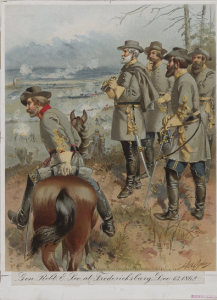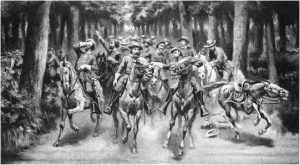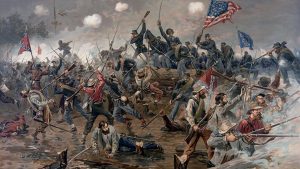Lee’s Luck
Emerging Civil War welcomes back guest author John Roos…
As the 214th birthday of Robert E. Lee has come and gone, I couldn’t help but to reflect on the general. Living in the Fredericksburg area, and giving tours on all the major fields in this area, I have come to see the evolution and devolution of the commanders that fought this war. Lee was a constant though. Always maintaining poise and control, he was one of the greatest military minds of a generation. Another aspect of Lee on the battlefield that I came to learn is that he gained victories when all odds were against him. Many times it was not just Lee’s skill on the battlefield, but luck also played a role in the victories and stalemates, Lee achieved. I have said on my tours that not only do you need skill to defeat your enemy on the battlefield, but luck will play a huge role as well. No figure may have found more luck on the battlefield than Robert E. Lee.
Whether it was McClellan, Pope, Burnside, Hooker, Meade, or Grant, they would all suffer defeats against Lee. This might be the one area in which Lee was consistently lucky. Fighting commanders like McClellan, Pope, and Hooker gave Lee opportunity after opportunity to be bold, daring, press his luck, and defy all odds to win battles. Despite suffering casualties in battle, luck and momentum stayed with Lee. That luck and momentum was tested in December of 1862 at the Battle of Fredericksburg. Here, Lee got extremely lucky multiple times and it cost him very little to gain victory.

Lee’s luck at Fredericksburg reached its zenith. While at his headquarters on Telegraph Hill, a Union artillery shell landed near Lee and did not explode. There was also a brand-new cannon from Richmond near Lee and his second in command, General James Longstreet on Telegraph Hill. On the 39th shot, the gun exploded. Lee and Longstreet were both knocked off their feet but came out of the explosion unscathed. Could that be fate? Maybe. Let’s just say Lee was lucky he was not killed twice while watching the battle. Also, despite the fact that the Union commander, General Ambrose Burnside, set forth a good battle plan and executed the early part of it very well, incompetency with logistics and among subordinate commanders gave Lee the openings he needed to win the battle. These moments show that skill and luck play a hand in military campaigns. These moments at Fredericksburg are also the last time Lee’s luck would not cost him greatly.
The Battle of Chancellorsville was the next campaign after Fredericksburg. The Union commander, General Joe Hooker, enacted and executed a great plan as well. Unlike Burnside, Hooker gave up all the initiative the first day of the battle. If Hooker let his generals continue their attacks on May 1st, 1863, “Stonewall” Jackson might have been trapped in a vice. Lee and Jackson got extremely lucky and giving up the initiative in the face of two of the most aggressive officers in the Confederacy all but sealed the fate of Hooker at Chancellorsville. Lee would enact some of his boldest plans at Chancellorsville and it would result in arguably Lee’s greatest victory. But what did his “greatest victory” cost him? Not only was Jackson wounded by his own men and died on May 10th, 1863, but over 13,000 casualties were suffered. The bloodletting forced Lee’s hand to reorganize his army prior to marching north in June of 1863, and the result of that was the Battle of Gettysburg.

At the Battle of the Wilderness, Union and Confederate forces suffered heavy losses in the morning hours of May 6th, 1864. Within the Widow Tapp Field, a combined effort led by Union 2nd Corps commander General Winfield S. Hancock, pushed Lee’s 3rd corps to the brink of destruction. All that stood between Lee and surrender were General William Poague’s six cannons. Hollywood could not have written a better moment. Through the smoke, troops from Texas appeared. Lee was overcome with emotion and the tide of battle shifted in favor of the confederacy. The Texans’ arrival stopped the thrust by Hancock. Lee was lucky he was not killed when trying to enter the battle with the Texans. Longstreet led this repulse and authorized a flank attack to get around Hancock. At the height of another successful flank attack, Longstreet was wounded, like Jackson, by his own men. All that momentum gained when the Texans arrived evaporated. It would be hours until Lee could mount another offensive. Lee lost 11,000 men in a stalemate at the Wilderness.
Since Fredericksburg, Lee’s luck had taken a terrible shift. Gettysburg aside since he lost that battle, the two battles he either won or fought to a draw cost him 24,000 men and his two top generals. Longstreet would return, but well into the Siege of Petersburg. One final look at Lee’s luck taking a turn would be the Battle of Spotsylvania Court House. On May 11th, 1864, Lee made one of his worst field decisions when he assumed Union movements were a withdrawal. Lee ordered all artillery from a spot known as the Mule Shoe removed. This move gave Union forces a huge opportunity when they launched their attack against the Mule Shoe on May 12th. What ensued was the longest sustained fighting of the war, twenty-two continuous hours of combat in the rain. Like any human being, Lee was not perfect. The fog of war, exhaustion of another summer of war on the horizon, minimal cavalry at his disposal, or a number of things could explain his decision to remove the artillery from the Mule Shoe. This poor decision would cost Lee in the end. Whether captured, killed, or wounded, Generals Ed Johnson, George Steuart, Abner Perrin, James Walker, Junius Daniels, and a total of 9,000 casualties. Dogged determination on the part of thousands of confederate troops gave Lee the time he desperately needed to build a new line of defense. Lee was lucky his line held.

Lee was a master of the battlefield. There is no denying that. Do I think he was a butcher for carrying on the war as long as he did? No. That was his duty as a commanding officer. What I do believe is at the Battle of Fredericksburg, the legend of Marse Robert was born. Just before the retreat from Gettysburg, a soldier heard Lee say, “I thought my men were invincible.”[1] Despite taking fault after Pickett’s Charge, I feel that invincibility Lee referenced was something that stuck with him throughout the war. No matter the cost, Lee believed in the cause for which he fought. The problem is that maintaining a war effort running often on skill and luck, one of those things was destined to start running out on him. What are your thoughts? Did Lee press his luck even though casualties mounted?
What other examples of Lee’s luck do you know of from the Civil War?
————
[1] Noah Andre Trudeau, Gettysburg: A Testing of Courage (New York: Harper Collins, 2002), 542.
Bibliography
Trudeau, Noah Andre. Gettysburg: A Testing of Courage. New York: Harper Collins, 2002.
John Roos is a graduate of Southern New Hampshire University with a Bachelor’s degree in American history. He is currently working towards his Master’s degree, also in American history. John was an intern and volunteer with the Fredericksburg and Spotsylvania National Military Park. After a period of time with the National Park Service, he moved with his wife Sarah back to Fredericksburg where he is a battlefield guide with Fredericksburg Tours and is a licensed teacher in Virginia with an endorsement in Social Studies. John began his love of the Civil War when he visited Gettysburg with his family when he was 10-years-old.
Great article John Loved it!! Keep up the great work. You make it so interesting to the novice.
Experience and expertise are involved in making success look like “luck”, although sometimes incompetence on the opposing side can help, too.
Good points, but what else could he do? The Fabian strategy Washington used in the Rev War could not work in the Civil War for the duration. Grant proved that.
I have observed in many facets of life that successful people make their own luck. There is an old saying that I would rather be lucky than good, but to be good and lucky is what makes a very successful person.
In my view, Lee’s “luck” was his audacity.
The greatest luck of all was at Antietam with the sudden appearance of AP Hill arriving to obliquely crush Burnside’s overwhelming attack on the far right of Lee’s undermanned line. Possible confusion for Burnside’s corps was the Hill’s troops wearing captured Union uniforms.
Absolutely great points
Lee was lucky at the end of the war that he wasn’t killed by a sniper.
Near the end, I think he preferred death to surrender, and then on the ANV’s last fighting day he stated to ‘prefer a thousand deaths’ than to see General Grant.
There’s a story of a young messenger, near the end of the war, carrying a note to General Lee who was in an exposed position. The messenger thought twice about going out to where Lee was but decided he had to show his bravery to the General, and the messenger got himself promptly chewed out by the General for unnecessarily exposing himself to deliver the message. Lee told him it was a generals job to be exposed (his excuse, if you ask me.)
***The United States was even luckier that Lee wasn’t killed by a sniper at that time, too.
Without his LEE-dership the end of the war could have gotten ugly fast.
Old Pete would probably have replaced him had he been killed, and I think it likely Grant would have given his friend Longstreet the same terms, but Alexander Porter who wanted to go guerilla, until corrected by Lee, probably reflected many a thousand Confederate’s sentiment.
IMO, anyone who survived four years of war, any war, had some luck.
Lee’s heart disease may have affected his judgement, and therefore his ability, at least after Chancellorsville.
Heart disease definitely affected Lee at North Anna where he was too stricken to attack an isolated Union corps but I appreciate Gary Gallagher’s remarks that the success of his infantry at Chancellorsville gave Lee the impression his infantry were invincible, hence Pickett’s (Longstreet’s) charge.